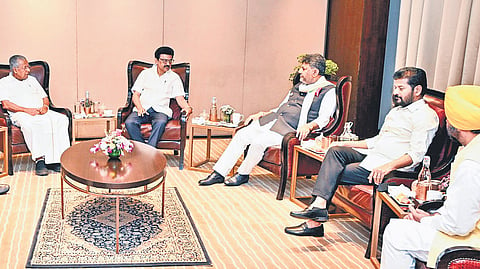

CHENNAI: Ever since Dravidian politics took root in Tamil Nadu, it has been well established that the state has displayed an inherent tendency to oppose attempts at centralisation of powers by the union government.
Fuelled by the strident opposition against Hindi imposition since pre-independence and a strong sense of pride in the Tamil identity, the state has almost stood out among others in its resistance against encroachment on the autonomy of states.
Among the two major Dravidian parties, it is the DMK that has been more vociferous on the issue. One key initiative by the DMK, after becoming the first regional party to come to power on its own in 1967, was the constitution of the P V Rajamannar committee to study centre-state relations and suggest suitable measures to devolve more powers to the states.
Irrespective of whether the DMK has been in power or not, the fight for states’ rights has been its key plank, albeit occasional malleability shown due to political compulsions, especially when it was sharing power at the centre.
It is, however, the present DMK government led by Chief Minister M K Stalin that has taken up the issue most fiercely, aided in no small measure by the attitude and measures of the BJP-led government at the centre. It would not be an exaggeration to say that Stalin has become the rallying point for opposition-ruled states that blame the union government for discriminating against them.
The apogee of the incumbent government’s fight on this front has been the verdict of the Supreme Court last month, which came down heavily against centre-appointed governors being used to impede the functioning of the elected state governments.
The judgement, delivered in a case filed by Tamil Nadu against the stalling of bills by Governor R N Ravi without granting assent, has been hailed as a landmark verdict delivered since the Constitution came into force, with far-reaching implications. Stalin has taken the lead in putting up a united front with other like-minded states in demanding that the impending delimitation exercise be done fairly with no changes in the proportion of representation of every state in the Parliament.
The present government has also vehemently opposed the union government encroaching on sectors like education and health. Its firm stance against the National Education Policy — and the compulsory introduction of the three-language policy in particular — has resulted in the centre refusing to release funds amount to Rs 2,142 crore under the Samagra Shiksha scheme last financial year.
The most recent measure has been a constitution of a committee headed by retired Supreme Court judge Kurian Joseph on the lines of the Rajamannar committee to study centre-state relations in a fresh perspective, taking into consideration the political trajectory the country has taken in the past five decades.
DMK’s success also lies in influencing Congress, which has predominantly shown centralising tendencies whenever it was in power, to agree in principle for devolution of more powers.
The ruling party’s persistent fight on this issue has not gone without criticism by sections of opposition parties, that the DMK is using it to hide its alleged governance failures. There may be an element of truth in it, but one cannot deny the legitimacy of many of the demands, as endorsed by the SC in its recent verdict, and the fact that it has often put the BJP on its backfoot in the state.
With the AIADMK and BJP joining hands again, it is this narrative that the DMK will bank on mainly to return to power in 2026.